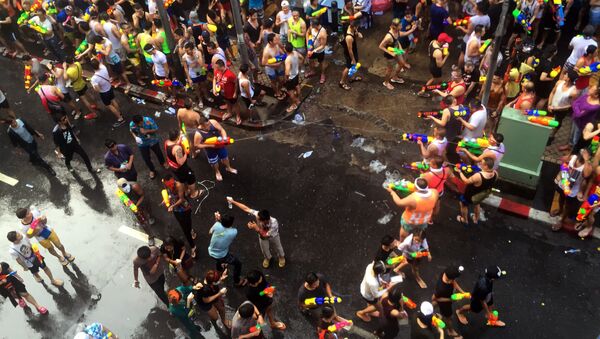"Women have the right to dress however we choose, as long as it's not illegal. Sexual assault and harassment is never the woman's fault!!" Sininya Bishop wrote on Twitter. "Tell men to keep their hands to themselves!"
The post by the presenter of Asia's Next Top Model's has been viewed and re-tweeted hundreds of thousands of times with women joining in and sharing experiences of sexual harassment during the three day Songkran festival.
She told Bloomberg: "Maybe the reason this is taking off faster is because they're not coming out and accusing anyone. Our society is quite conservative, and for someone to come out and point a finger at someone who's assaulted her is huge, I don't know if we're ready for it yet."
Our #DontTellMeHowToDress #TellMenToRespect campaign is making headlines all over the world. Still hard to believe how fast it’s gone global but just goes to show you this is not just an issue affecting women in Thailand but women in every single country. pic.twitter.com/cn31sS2t7S
— Cindy Sirinya Bishop (@cindysirinya) April 15, 2018
In Thailand we teach our daughters to “รักนวลสงวนตัว” or to be modest and “reserve” ourselves yet we neglect to teach our sons to treat women with dignity & respect. That’s why a woman is still getting blamed for sexual assault… Somehow she failed. #DontTellMeHowToDress
— Cindy Sirinya Bishop (@cindysirinya) April 14, 2018
It would be much better for the government to order men to not act like untamed animals. #DontTellMeHowToDress
— Johnny Boy (@John_tb) April 13, 2018
'Me Too'
The rhetoric #DontTellMeHowtoDress behind the hashtag resonates with the recent #MeToo campaign which was adopted by people sharing their experiences of rape and sexual assault following the exposure of the Hollywood producer Harvey Weinstein as a sexual predator.
READ MORE: Weinstein Co. Files for Bankruptcy, Allows Abuse Victims Among Staff to Speak Up
The original 'me too' movement was founded in 2006 to help survivors of sexual violence, particularly from Black and minority ethnic communities be "at the forefront of creating solutions to interrupt sexual violence in their communities."
All eyes on #MeeToo. Illustration for Diablo Magazine about how this social media campaign has been inspiring collective courage to speak up. #conceptual #illustration #hashtag #socialmedia #women https://t.co/jAiND6bU8o pic.twitter.com/xDxcEVKdoE
— Davide Bonazzi (@DavideBonazzi2) April 17, 2018
Twitter and Instagram are used around the world to share experiences and express solidarity with other survivors of sexual violence. The #IBelieveHer hashtag recently went viral after two international rugby players in Northern Ireland were found not guilty of raping a 19 year old girl. Despite the unanimous 'not guilty' verdicts, support for the accuser accelerated on social media.
READ MORE: #IBelieveHer Trending After 'Not Guilty' Verdicts in Ireland Rape Trial
I hope the victim in the #PaddyJackson rape trial can see that her bravery has not been futile. This brave lady has opened the barriers of justice system for victims of rape in the North & South of Ireland. #IBelieveHer
— Cailínbán 🥛 (@cyber_michelle) April 13, 2018
'Kinky Boots'
However, not a million miles away from the #DontTellMeHowtoDress backlash in Bangkok, it's emerged trainee female barristers in Britain will be penalized in exams if they wear short skirts or "kinky boots".
A list leaked by blog Legal Cheek reveals how many points trainees will lose for wearing a skirt above the knee or revealing their bra in someway. "Shirt should be predominantly done up, cleavage should not be on show."
The handbook is given to students on the professional training course at BPP University which trains solicitors and barristers across the UK. A spokesperson told London newspaper The Daily Telegraph, "the list has not been revised for a long time, and will be reconsidered before the next publication."
Trainee barristers told they will be marked down for wearing short skirts
— Casual Apparel (@casualappareluk) April 17, 2018
Other risqué sins of fashion as laid down by BPP law school include colourful socks and ‘kinky boots’ https://t.co/cTIntD1ATZ #casualapparel pic.twitter.com/JNUDF7vdF1
Hashtags are fast becoming digital archives of everyday experiences of sexual harassment, reported in real-time. The Everyday Sexism Project was founded in April 2012 and aims to document examples of sexism from around the world using the hashtag #everdaysexism in a recent article for the Guardian, founder Laura Bates said the past five years had been "more hopeful than despairing."
Fabulous Laura Bates, author talking about workplace sexual harrassment which dominated the stories for #everydaysexism at WoW. #sexualharassment #metoo @EverydaySexism @WOWtweetUK @RachelintheOC pic.twitter.com/ajodpGIPeG
— Judith O'Toole (@jcstaff_) March 9, 2018



